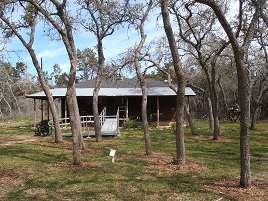I had been looking forward to meeting and talking with Vietnam War veteran Allen Hancock. Finally, thanks to local Austin, Texas, Realtor Jean Susaraba, there I was in her comfortable living room talking with Hancock. I could tell, however, that Hancock was not comfortable talking about himself.
Somehow our conversation turned to Hancock’s father and he opened up a little more. From the way Hancock talked about his father — his eyes moistening, his voice choking up a little bit — it was apparent that Hancock is very proud of him — and rightly so. You see, Hancock’s father, Allen W. Hancock, served in the Philippines during World War II, was taken prisoner by the Japanese, forced to march in the tortuous “Bataan Death March” and spent an equally tortuous 44 months as a prisoner of war in Japan.
“Young” Allen Hancock — he is 58 now — served in the U.S. Coast Guard off South Vietnam during the Vietnam War and, having received serious injuries to his right leg, was disability-discharged in 1975.
Although Hancock served his country honorably during wartime overseas, as did his father, and was injured, he doesn’t like to talk about his service — he feels he was just doing his job. “I was just down in the engine room on a ship … I can imagine what the ‘ground pounders’ went through,” he says modestly. I also get the impression that Hancock compares himself to his father, who he feels sacrificed so much more.
But Hancock himself would go on to suffer more than many of us can imagine.

Perhaps due to his wartime leg injuries, which still cause him severe pain and problems, Hancock was involved in a serious motorcycle accident in Austin last May. As a result of that accident, Hancock underwent above-knee amputation of his left leg and has been in and out of hospitals, including the renowned Veterans Administration (VA) Audie L. Murphy Polytrauma Rehabilitation Center at San Antonio, where he was fitted for a prosthetic leg.
Hancock was not wearing his new prosthetic leg but he had plenty to say about the trials and tribulations of getting used to one and about the strange and painful after-effects of having lost a leg, such as phantom sensations and pain in a limb that is no longer there.
We were in Susaraba’s home because when Hancock was discharged from his latest VA hospital in Temple, Texas, he had literally nowhere to go. Susaraba, who knew Hancock from an earlier friendship her son had with him, had graciously taken Hancock into her home until his new home was ready.
And here is where the story of a veteran who has gone through so much takes a turn for the better because of the empathy and hard work of fellow veterans, the goodwill of regular citizens, and the generosity of local merchants and organizations.
Hancock’s “new home” happens to be a small house — one of seven rental houses — on the beautiful wooded “Hill Country” grounds of Veterans of Foreign Wars (VFW) Post 4443, “Veterans Cove,” in Austin. As part of Post 4443’s commendable efforts under Commander Henry “Hank” Irwin to reach out to veterans and to the community, it immediately decided to make the rental house available to Hancock upon hearing about his situation.
However, before Hancock could move in, there was a lot of fixing to be done to the house — and quickly — because the disabled veteran was to be discharged in a few days by the VA.

VFW members such as Robert “Chappy” Chaplin — along with his grandson Caleb Chaplin — Bob Kountz and others grabbed hammers, saws, paint brushes and, applying a lot of elbow grease and innumerable labor hours, tackled the job with enthusiasm — almost devotion. Others such as Mike Jordan and VFW member John Tschirhart joined forces with Susaraba, whose husband was a charter member of Post 4443, to involve the local community and to obtain labor and materiel donations from local merchants — ranging from new floors and floor coverings, cabinets and appliances, to new roofing — to make the small house Hancock’s “new home” in every sense of the word.
Susaraba was even able to make the glacially-moving VA cut through layers of red tape and install a super-duper ramp for Hancock to enter his home using his new, VA-furnished, motorized wheel chair, and to provide various other safety and disability equipment and services.

While Hancock has some mixed feelings about how the government and the VA have handled his service related disability claims and issues, he is “at a loss for words” — his words — to express his gratitude for what this unique combination of a caring veterans organization and a compassionate and grateful local community and individuals are doing for him.
Painfully remembering how our Vietnam veterans were treated after that war, Hancock is almost overwhelmed by this outpouring of sympathy and goodwill. But, still comparing his sacrifices to those of his father and others, Hancock says, his voice breaking, “I don’t deserve this.”
It is gratifying to see Americans take a second look at the sacrifices Vietnam War veterans made during that “unpopular” war. Along with Hancock, they deserve tons of gratitude and every ounce of support Americans can give them. Hopefully we have begun to undo some of the hurt, humiliation and neglect the nearly three million Vietnam War veterans suffered when they returned home from serving our country.
Hancock moved into his new home a few days ago.
Fellow veterans gave this Coast Guard veteran the “welcome home” he didn’t receive nearly 40 years ago and their wishes that, in Veterans Cove, he will finally find a safe and peaceful harbor.
Crossposted from The Huffington Post

















